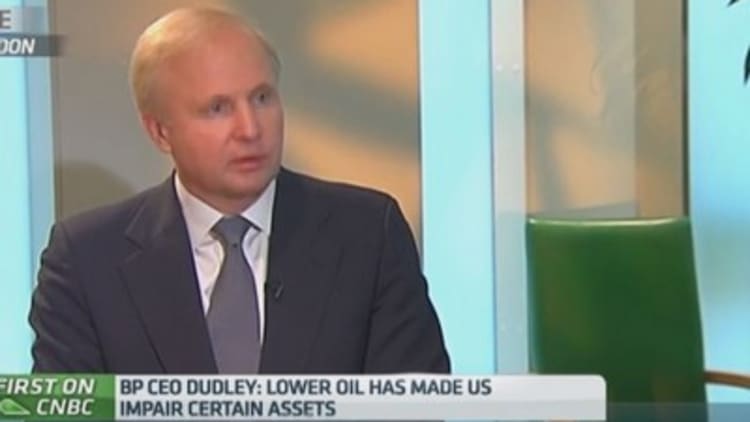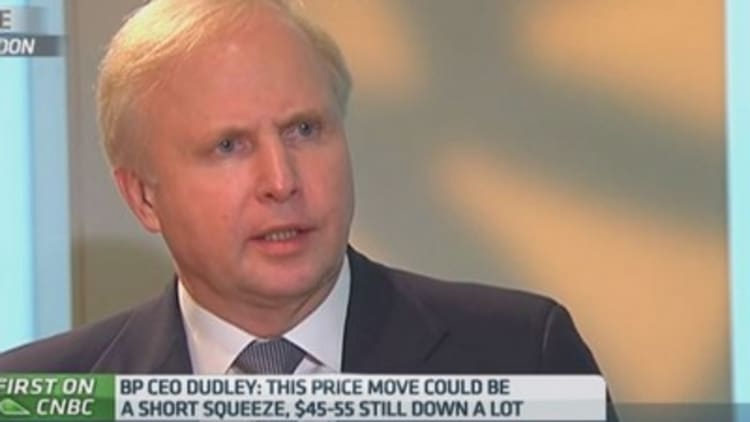



Oil prices may remain at $50 per barrel "for some time," the CEO of BP warned on Tuesday, after the supermajor reported a quarterly impairment charge of $3.6 billion on the back of tumbling energy prices.
"With the lower oil prices, certain triggers have made us, through accounting reasons, impair a good chunk of our assets. That's just a reflection of the world we are in today," Bob Dudley, the head of BP, told CNBC on Tuesday.
BP reported a replacement-cost loss of $969 million for the fourth quarter of 2014, after taking a $3.6-billion post-tax net charge relating to impairments of upstream assets given the fall in oil prices. On an underlying basis, replacement cost profit came in at $2.2 billion, above analyst expectations of $1.5 billion.
The company said that organic capex was set to be around $20 billion in 2015, significantly lower than previous guidance of $24-26 billion. Capex for 2014 came in at $22.9 billion, lower than initial guidance of $24-25 billion.
Dudley attributed the cut in capex to both falling oil prices and the aftermath of its Deepwater Horizon spill in 2010.
"We needed to do it, one to rebase the costs and put BP in a world that might be $50 oil for some time," Dudley told CNBC on Tuesday.
"In addition, we were a very complicated company after our events in 2010. We overcomplicated it, we were simplifying the company anyway, were were going to be streamlining it, so these have come together."
Read MoreTrack BP shares live
London-listed BP shares rose by around 3.5 percent in early trade after the company posted its results. They then fell back to trade around 2.6 percent higher on the day.
Dividend 'No.1 priority'
BP's results announcement came after rival Royal Dutch Shell announced a three-year $15-billion cut to spending in its earnings report last week. Both oil supermajors opted to hold quarterly dividend payments, however, which are viewed as key to maintaining attractiveness for investors.
Read MoreBig Oil cuts back as analysts slash forecasts
"We will absolutely protect the dividend payment. That is the number one priority," Dudley told CNBC.
Following its results, Naeem Aslam, chief market analyst at Ava Trade, was moved to call BP the "stock of the day."
"We believe that BP has put on (a) fantastic performance and (the) dividend announcement by the company was a brave move, especially if you look at the price of oil, which is down nearly 56 percent from its peak," Aslam said in a research note.
"If the oil price stays where it is, it will be difficult for companies like BP to allocate more capital to new projects, especially where their marginal costs are very high, therefore if they want their investors to remain addicted to their stock, one way of achieving that will be to attract them with heavy dividends which BP has done today."
'We're looking at Ukraine tensions'

The oil rout from June 2014 has hit BP and its rivals hard, with shares of BP have fallen by roughly 14 percent over the period.
Several of the oil giants have announced cost-cutting measures or put exploration plans on hold. BP announced that it was going to cut around 200 staff and 100 contractor roles in its onshore operations in the U.K. last month, in light of "toughening market conditions."
Read MoreTrack Brent crude oil prices live
BP also took a hit from its shareholding in Russia's state-owned Rosneft, which has suffered due to Western sanctions on Russian companies and from the sharp depreciation in the ruble.
Estimated underlying net income from Rosneft was $470 million in the fourth quarter of 2014, compared with $1.1 billion in the same quarter in the previous year.
Read MoreTrack WTI crude oil
Despite the sanctions, Dudley said Rosneft was behaving "like any of the other majors."
"We have a long history of working in Russia," he added. "Like everyone we are looking at the tensions around Ukraine…We see this as a very long investment. We will stay within the sanctions."

